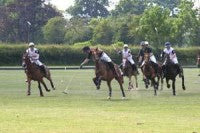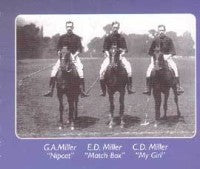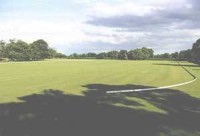Rugby Polo Club
Rugby Polo Club
By Laurence Gale

Brief history:


Due to the history associated with the club and since its formal opening in 2000 there has been fantastic interest in the club. The newly formed club is now into its fourth playing season and has well over 60 playing members. The club is situated in 520 acres of Midlands pasture land. The club encourages newcomers to the sport and offers to teach new members the rudiments of Polo and horsemanship.
Present Site:
The club still uses the original polo field grounds based at Springhill farm, Rugby which consists of two 14 acre polo pitches and a 5 acre stick and ball (practice) pitch. The pitches have been established since the club was founded in 1893.
The pitches are used every day of the week, with school and university students being taught on the stick and ball ground every weekday. Club chukkas are played on one of the pitches usually on Wednesdays, Saturdays and Sundays. There are eight tournaments held at the grounds over one summer season. Each Tournament consists of around seven to ten matches, with four, seven-minute chukkas being played per match. Over one weekend a year, two tournaments are run together with around twenty matches being played in one weekend.
Pitch preparation and maintenance: 
Over the winter months, usually from October to March, the pitches are not used and sheep are put out to graze on them to help ensure the grass does not grow too much. During these months no direct groundwork is undertaken.
The polo season begins in late April/early May, so pitch preparation begins in late March/early April. In preparation for the season the pitches are:-
- Chain Harrowed
- Rolled
- Sprayed for Moss and Clover
- Fertilised
- Mown
Throughout the season, from May to August, the grounds are be mown regularly and chain harrowed and rolled as required. The pitches are mown using tractor mounted gang mowers, with smaller areas and corners mown using ride-on mowers. The pitches are edged with boards, which require strimming to keep tidy.
The club currently has no facilities for irrigating the grounds, relying on the traditional British weather to provide natural rainfall to keep the grass growing. The polo fields are fertilised once at the beginning of the year with Ammonia Nitrate (32-5-0), which is usually sufficient for the remainder of the season.
The club has a small but efficient array of equipment for maintaining the Polo fields:
- 1x Ford Tractor with mounted gang mowers
- 1x Massey Ferguson tractor for rolling and other works
- 1x ride-on tractor mower
- 1x petrol strimmer.
- 1x rotary lawn mower
- Fertilising and spraying equipment are borrowed from local farmers.
The club does not employ a full time Groundsman, but relies on other employees of the club and volunteer members. Due to the nature of the game, with horses turning sharply and stopping quickly, this tends to create divots, skid marks and holes in the turf. At the end of each day's play the divots have to be replaced and any damaged areas are trodden in and repaired as best as possible. The members and players usually carry out these divot repairs. It is important that regular checks are made for any holes or rabbit damage as these can cause the horses to trip. Clover holds water and becomes slippery which can be cause horses to slide. The pitches are sprayed each year for clover.
As with most sporting clubs, there is always pressure from club members who want to play regardless. There has to be a balance between keeping members happy and satisfied and not causing severe damage to the playing surfaces, especially when they become wet.
The club welcomes any new members and offers a wide range of lessons for playing Polo. The club can be contacted through Karen Morgan telephone 01788 817724, Email : rugbypoloclub@hotmail.com, Web address is: www.rugbypoloclub.com
For further information on the rules of Polo follow this link :Polo rules:
